Sunspots on Asian Skin
Sunspots, also known as age spots or liver spots, are a type of hyperpigmentation characterized by gray or brown spots that form on the skin’s surface due to repeated sun exposure and can appear on individuals of any skin type or skin tone. Asian skin is often more prone to discoloration skin conditions, such as sunspots, melasma, rosacea, seborrheic keratosis, and post-inflammatory hyperpigmentation (PIH) due to the amount of the pigment melanin found in the skin. Dark spots occur on the skin when the pigment melanin is overproduced in cells called melanocytes. Many risk factors can lead to this overproduction of melanin in Asian skin, including sun damage due to a lack of sun protection, acne scars, and hormone fluctuations. While sunspots do not indicate melanoma or skin cancer, they form most often on body parts frequently exposed to UV rays, such as the face, making patients self-conscious. Luckily, many sunspot treatments available at board-certified dermatologist Dr. Michele Green’s office are safe and effective for Asian skin.
Laser treatment is one of the most effective solutions for dark spots on the skin’s surface; however, specific lasers can cause damage to darker skin in the form of post-inflammatory hyperpigmentation, so it is essential to consult an expert like Dr. Green. For Asian skin, Dr. Green typically recommends a gentle fractional laser, such as the Clear + Brilliant laser, the Candela Alex Trivantage laser, or the VBeam laser, to shatter pigmentation and boost collagen production for total skin rejuvenation. Dr. Green can also recommend a skincare routine with products explicitly designed to reduce the appearance of dark spots, such as hydroquinone-based skin-lightening creams and Vitamin C serums. Most importantly, Dr. Green recommends using sunscreen of at least SPF 30 to prevent age spots and other sun damage.
Board-certified dermatologist Dr. Michele Green has been expertly treating patients of all skin types at her Upper East Side New York City dermatology office for more than twenty-five years. Dr. Green knows which laser treatments and skincare products are safe and effective for use on Asian skin and can recommend the treatment plan that will be best for you. With a wide range of treatment options available for sunspots, including laser treatment, intense pulsed light (IPL), chemical peels, and topical skincare products, as well as additional anti-aging solutions like dermal fillers, Microneedling, and Botox, Dr. Green is well-equipped to create a customizable treatment plan to meet all your needs and aesthetic goals. Well-known for high patient satisfaction, Dr. Green has been voted one of the best healthcare providers in New York City by such publications as Castle Connolly, New York Magazine, and Super Doctors.
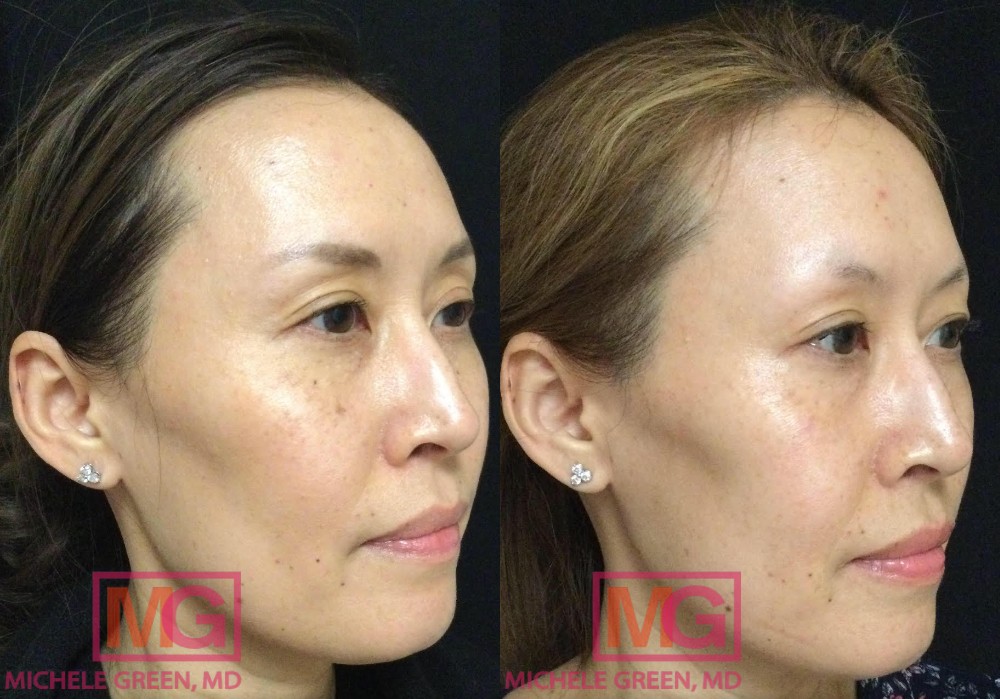
Skincare for dark spots on Asian Skin
The first step in eliminating the appearance of dark spots on Asian skin is to find a board-certified dermatologist experienced in treating Asian skin, such as Dr. Green. Certain types of lasers can harm Asian skin, leading to post-inflammatory hyperpigmentation and worsening dark spots that already exist. Dr. Green has many treatment options for patients with Asian skin, including gentle lasers like the Clear + Brilliant laser and gentle chemical peels, such as the Cosmelan peel and Mesopeel. Certain skincare products, such as Vitamin C serum and prescribed skin-lightening creams, can also safely reduce the appearance of dark spots on the skin.
What are sunspots?
Sunspots are a skin condition characterized by flat brown areas of discoloration caused by repeated exposure to the sun’s harmful UV rays over time. Most common in patients over 40, sunspots develop on areas of the body that are most frequently exposed to the sun without protection, including the face, neck, arms, and hands. Sun exposure is the number one cause of premature aging, and sun spots are also known as age spots or liver spots (though unrelated to the liver). Sun damage leads to hyperpigmentation on the skin, further developing fine lines and wrinkles and drying out the skin. Sunspots can vary in size and shape but are generally flat and round, marking them as different from signs of cancerous lesions, which are shifting and growing moles with irregular borders. However, if you are unsure about a new or developing dark spot on the skin’s surface, it is always best to consult an expert dermatologist, such as Dr. Green.
What causes dark spots on Asian Skin?
Dark spots are caused by increased melanin production in the melanocytes, or pigment-producing cells, in the dermis. Several risk factors can lead to the overproduction of melanin in the skin, including unprotected exposure to the sun, acne breakouts, hormone imbalance, inappropriate laser treatment for your skin tone, and certain medications. The sun’s UV rays are a common cause of the development of dark spots on the skin, as repeated exposure to UV rays triggers the melanocytes in the body to produce more melanin to protect the skin. Melanin absorbs the UV rays, which protects the DNA from sun damage; however, sun damage can still occur in patients with a higher concentration of melanin in the skin. Most Asian skin naturally has a higher concentration of melanocytes than Caucasian skin, which means that most Asian skin has a higher degree of protection from the sun but is also more susceptible to the overproduction of melanin. In youth, the increased melanin production can lead to an even tan by the end of the summer. However, as we age, the body’s ability to evenly distribute melanin decreases, forming dark spots.
Post-inflammatory hyperpigmentation can also occur due to skin trauma resulting from an acne breakout, injury, or inappropriate laser therapy for Asian skin. Acne blemishes that become inflamed can cause lasting damage to the skin through acne scars, which can be depressed, raised, or discolored. Access to acne treatment as early as possible is crucial for preventing the formation of acne scars. When looking to receive laser treatment for dark spots, it is also essential that you choose a healthcare provider experienced in treating Asian skin, as some types of lasers can cause post-inflammatory hyperpigmentation when used on darker skin types.
Another potential risk factor for developing dark spots on the skin is hormone fluctuation, such as during pregnancy. As the production of different hormones fluctuates during pregnancy, melasma can occur, a skin condition in which the skin appears blotchy and pigmented. Melasma occurs most frequently on the lower face, cheeks, forehead, and chin though the pigmentation can cover all these areas. Sometimes called the “mask of pregnancy,” hyperpigmentation and melasma are standard, affecting between 45 and 75% of pregnant women.
Patients may also be at a higher risk of developing sunspots if they take certain medications that make the skin more photosensitive or sensitive to sunlight. In this case, the medication is not causing dark spots to develop on the skin; instead, overproduction of melanin is more likely to occur when the skin is more sensitive to sunlight. These medications can include certain antibiotics, antifungals, antihistamines, and antidepressants.
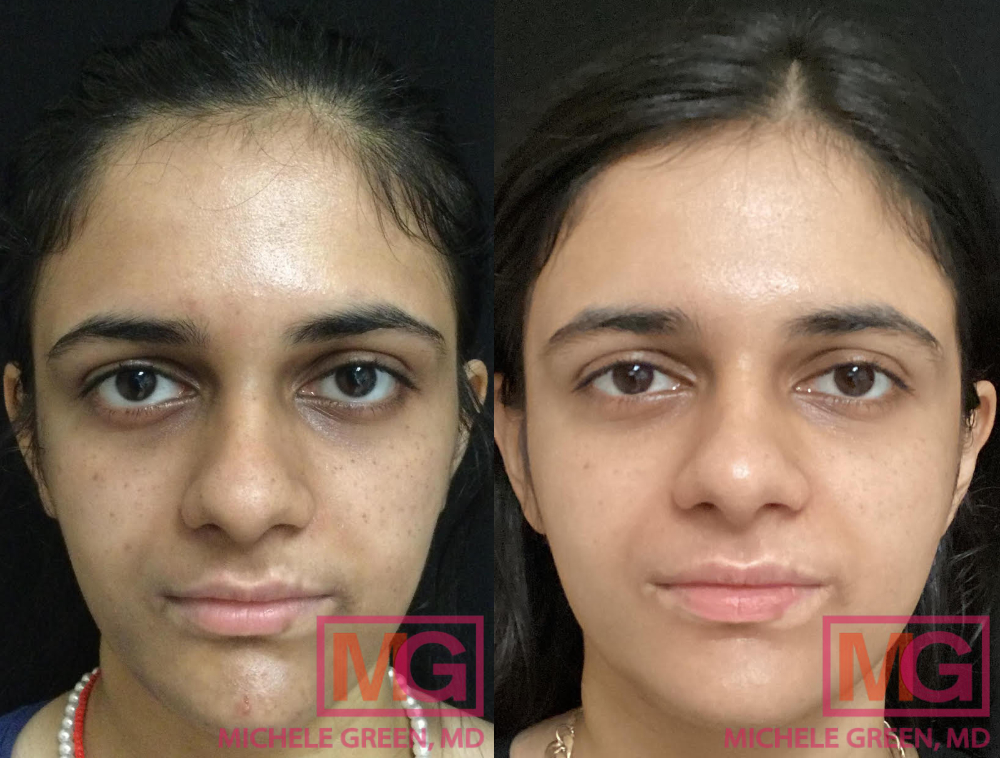
Will Asian sunspots go away?
Sunspots typically form on the skin after many years of sun exposure, which causes increased melanin production, leading to the formation of dark spots on the skin’s surface. Once the sunspots have formed, they will not fade naturally, meaning that if patients wish to reduce the appearance of sunspots, they must seek treatment from a dermatologist, such as Dr. Green. Dr. Green has many treatment options available that are safe and effective for Asian skin and is highly experienced in treating patients of all skin types. Once Dr. Green has examined the treatment area, she will recommend the treatment or series of treatments that best meet your needs.
How to get rid of sunspots on Asian Skin
There are many treatment options for eliminating sunspots on Asian skin, but you must choose a dermatologist familiar with treating Asian skin, such as Dr. Green. Specific laser treatments, skin care products, and types of chemical peels may not be suitable for all patients, so it is essential to seek treatment from an expert. You will begin the treatment process by having an initial consultation with Dr. Green, who will examine the treatment area and decide about the treatment or series of treatments that will be the safest, most effective for you. Regarding eliminating sunspots, Dr. Green will often turn to several safe laser treatments for Asian skin: the Clear + Brilliant Laser, Candela Alex TriVantage laser, VBeam laser, and eMatrix laser. With her proprietary line of skincare products, MGSKINLABs, Dr. Green can recommend the best skincare products for reducing the appearance of sunspots and preventing the development of further discoloration. Chemical peels, such as the Cosmelan Peel and the Mesopeel, may also be used to address dark spots, sun spots, and hyperpigmentation, with the Cosmelan peel being particularly effective in addressing melasma and the Mesopeel best for sensitive areas.
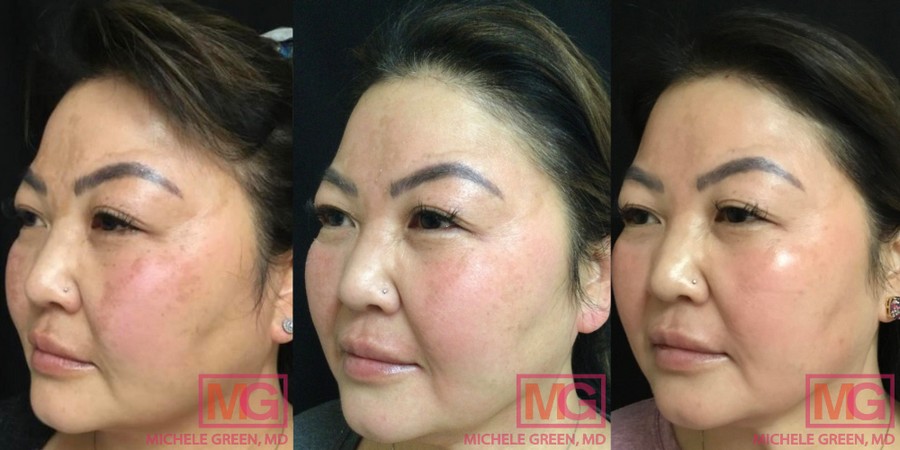
What is the best laser treatment for Asian Skin?
While there are many laser treatments available to treat hyperpigmentation, patients with Asian skin and skin of color have to be careful, as some laser treatment options can cause post-inflammatory hyperpigmentation (PIH), which is when additional dark spots form or worsen, or hyperpigmentation, which is the formation of white spots on the skin. When you consult with Dr. Green, she will recommend the laser treatment that will be safest for your skin tone. When it comes to treating dark spots or hyperpigmentation on Asian skin, Dr. Green recommends the following laser treatment options:
Clear + Brilliant Laser – While some fractional lasers are only safe to use on Caucasian skin, the Clear + Brilliant laser is a fractional laser that is gentle and non-ablative that is best used to treat age spots, improve skin texture, and decrease pore size for all skin types. The treatment works via fractional laser energy, which creates micro-wounds at the treatment area, stimulating the body’s natural healing response and boosting collagen production and skin cell turnover. The new skin revealed is lighter and more evenly textured, reducing the appearance of dark spots in five to six sessions with no downtime necessary. Any side effects of the treatment, such as swelling and skin irritation, are mild and fade within several days of the procedure.
Candela Alex Trivantage Laser – For deeper and more extensive areas of pigmentation, the Candela Alex Trivantage laser is the best choice for use on Asian skin, as it works to shatter pigmentation while leaving the surrounding skin unharmed. The Candela Alex Trivantage laser is highly effective at sunspot elimination, hyperpigmentation reduction, and tattoo removal. The pigmented lesion absorbs the laser energy, causing the pigment to shatter into smaller particles that the body can eliminate. The treatment is quick and straightforward, with a handpiece explicitly created for Asian skin.
VBeam Laser – The VBeam laser uses pulsed dye laser energy to target redness in the skin from rosacea, broken blood vessels, capillaries, acne scars, active acne lesions, and keloids. The laser treatment emits a wavelength of light energy designed to specifically target red pigment without damaging the surrounding skin. Considered the gold standard for treating red pigmentation, the VBeam laser is also safe for Asian skin, requiring no downtime post-procedure.
eMatrix Sublative Rejuvenation System – The eMatrix laser effectively treats sun damage, fine lines, wrinkles, and acne scars. It can be used for patients with sensitive skin and any skin tone. The treatment uses bipolar radiofrequency energy, heating the dermal layer of skin to trigger the body’s natural healing response, which boosts collagen production and promotes skin cell turnover. The new skin is more even in tone and texture and youthful. For optimal results, Dr. Green recommends between three and five treatment sessions.
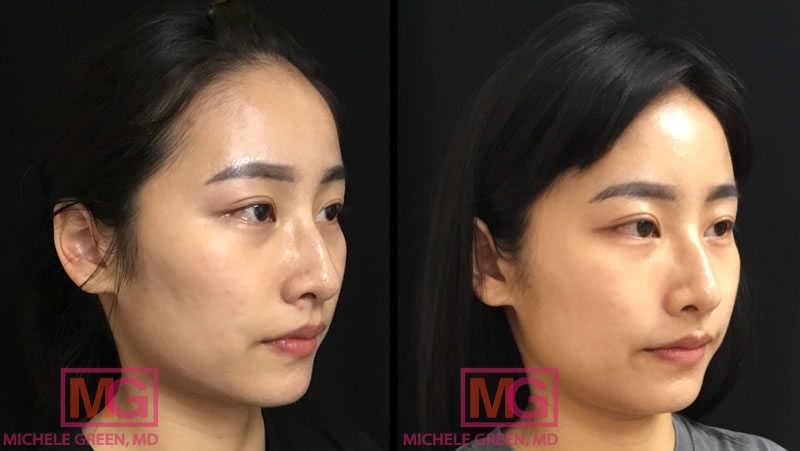
What is the best topical treatment for skin pigmentation?
Patients dealing with skin pigmentation can also care for their skin at home with topical creams, serums, and lotions available at Dr. Green’s proprietary MGSKINLABs. For treating dark spots, Dr. Green recommends the application of her Vitamin C serum combined with the AM/PM serum. The Vita-C and AM/PM serum can be applied morning and night and offer robust protection against antioxidants and free radicals. Further, the serums increase the production of the structural protein collagen, improving skin tone and texture and reducing the appearance of fine lines. For more severe dark spots, Dr. Green might prescribe a skin-lightening cream containing hydroquinone, which can be prescribed in varying strengths to reduce the appearance of hyperpigmentation.
The most effective way to prevent the formation of dark spots in the first place is to practice strict sun protection. To do so, Dr. Green recommends applying sunscreen of at least SPF 30 at the beginning of the day as the last step in your morning skincare routine and reapplying every two hours or directly after you sweat heavily or swim. Be sure to seek broad-spectrum sunscreen to protect against UVA and UVB rays. For skin that is particularly sensitive to the sun, Dr. Green may recommend a combination of chemical sunscreen, which rubs in, and physical sunscreen containing such ingredients as zinc oxide and titanium oxide. Physical sunscreen sits on the skin’s surface, forming a physical layer of protection against the sun’s rays.
Is there a dark spot corrector for Asian Skin?
Correcting dark spots can be easily added to your daily skincare routine by applying specific serums or creams. One such product that can be used to help reduce the appearance of sun spots or hyperpigmentation is Vitamin C serum. Vitamin C serum should be applied after the skin has been cleansed and thoroughly dried. The product improves skin cell renewal and increases collagen production, which helps create a more even skin tone and texture. One product acclaimed as part of the Korean Skincare Routine is the Cosrx Advanced Snail 96 Mucin Power, which reduces the appearance of dark spots, hydrates the skin and improves skin texture for an overall anti-aging effect. If you are unsure about the best product to use on your skin, consult an expert dermatologist like Dr. Green.
Is Asian Sunscreen better?
Applying sunscreen is the most crucial step in your morning skincare routine to prevent the formation of dark spots. Sunscreen application should be the last step of your skincare routine – after cleansing, exfoliating, moisturizing, and makeup application – so that other products do not dilute it. Many Asian companies sell sunscreens, which are often hydrating and sun protection. When choosing a sunscreen, it is all about finding the product that will work best for your skin. Be sure to seek out sunscreen that is broad-spectrum of at least SPF 30 and reapply throughout the day – even if you will not be outside for long. Wearing sunscreen every day is the best way to protect your skin from sun damage in the form of hyperpigmentation.
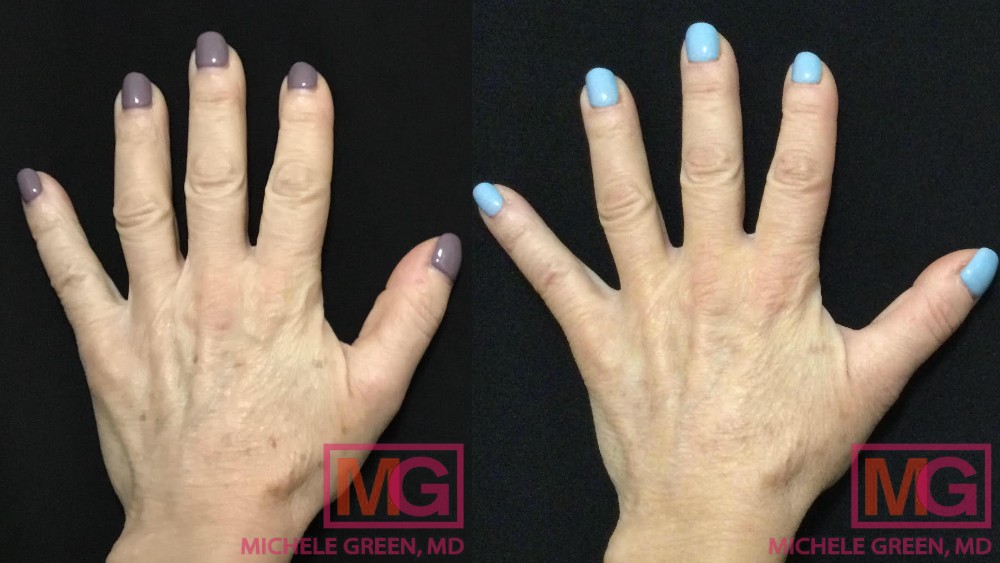
How do I get started with sun spot removal today?
Sunspots are brown or gray spots that can form on the skin’s surface over time due to frequent sun exposure. The sun’s harmful UV rays trigger the over-production of the pigment melanin, leading to the appearance of these dark spots and hyperpigmentation. Sunspots often form on the areas of the body that are most frequently exposed to the sun, such as the face and hands, leading many patients to look for a cosmetic solution. Asian skin can be more susceptible to post-inflammatory hyperpigmentation if the wrong type of laser or chemical peel is used. To achieve the best results and prevent unwanted side effects, it is of the utmost importance to seek a provider experienced in treating Asian skin. When it comes to treating sunspots on Asian skin, consult with an experienced, board-certified, expert dermatologist, such as Dr. Green in NYC, who can create a customized rejuvenation treatment plan that is safe and effective for you.
Dr. Michele Green is an internationally renowned board-certified cosmetic dermatologist with over 25 years of experience providing men and women worldwide with the best non-invasive treatment options available, including for hyperpigmentation and sunspots. She has expertise in treating patients of all skin tones and skin types, customizing each patient’s treatment plan best to suit their particular skin concerns and overall aesthetic goals. She is consistently voted one of New York’s best dermatologists by Castle Connolly, New York Magazine, Super Doctors, and the New York Times for her dedication to her patients and expertise. To schedule a consultation with Dr. Green in her boutique Upper East Side dermatology office, contact us online or call 212-535-3088 today.
 212-535-3088
212-535-3088